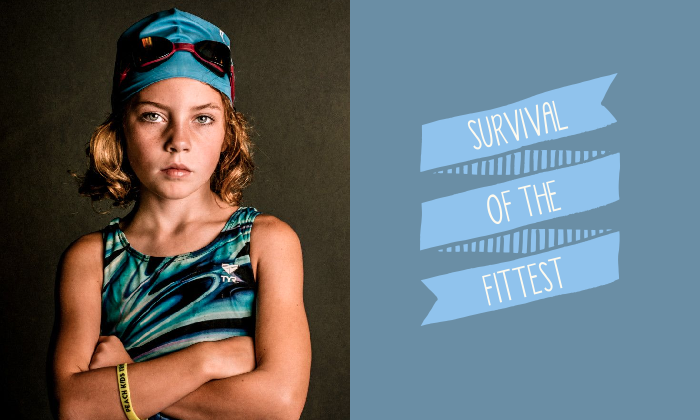
What to feed your sporty, tumbling tykes!
Having 2 young children that are actively involved in sports, I can attest to the importance of proper nutrition for optimal athletic performance. Gorging themselves on pizza, fries and soda before an important competition has always resulted in less than stellar results. The adage “you are what you eat” has never felt more appropriate than in the realm of athletics. All kids should eat a well-balanced and healthy diet as a general rule. For the young athlete, there isn’t that much of a change in the actual content of their diet, but more in the quantity and timing of meals.
Basic Nutritional Requirements For Young Athletes
Young athletes require higher energy and fluid intake than their sedentary counterparts. Proper nutrition enhances athletic performance by decreasing fatigue and injury risk and also enables athletes to increase endurance and recovery times. Coaches need to educate their teams on proper hydration, what foods are energy rich, when to eat certain foods, how to eat before and during competition, and what to eat for recovery post activity. Proper meals containing adequate proportions of macronutrients (carbohydrates, fats and proteins) and micronutrients (vitamins and minerals) are vital to fuel muscle activity and growth. Adequate hydration is essential to lubricate active joints and stave off possible cramping and heat exhaustion.

Carbohydrates
Carbohydrates are the main fuel source for athletes. Many adult diet plans call for a reduction in carb consumption, but this rule does not apply to our young athletes. The glucose found in carbs is stored as glycogen in our muscles and liver. This is the most readily available source of energy during strenuous activity. It is recommended that carbohydrates make up between 45% to 65% of total caloric intake for those under the age of 18. Choose whole-grain carbs and cereals whenever possible and include plenty of fruits and veggies.

Fats
Fat is another source of energy for athletes. It is harder to access than carbs but does come into play especially in prolonged endurance-type events such as long distance running. Additionally, fat-soluble vitamins (A,D, E and K) require fat in order to be absorbed by the body. Fats should comprise 25% to 35% of total energy intake for our young athletes. Saturated fats, which are found in deep fried fast foods, baked goods, chips, chocolate bars, etc., should account for less than 10% of total caloric intake. Excellent sources of fat include fish, avocados, lean meats, seeds, nuts, dairy products, olive and coconut oils. Fat from chips, candy, fried foods and baked goods should be minimised.

Protein
Proteins are crucial to athletes. They serve as the building blocks of muscle and are vital to growth, recovery and repair. As a source of energy they are used very sparingly. But if needed, they can be converted to glucose via gluconeogenesis. This involves the breakdown of muscle to be used for energy. Protein should account for approximately 10% to 30% of total caloric intake. Eggs, lean meats, poultry, fish, beans, nuts and dairy products are all great sources of protein.

Vitamins and Minerals
The human body requires an abundance of different vitamins and minerals. For athletes there are 3 that are of particular significance: Calcium, Vitamin D and Iron.
Calcium plays a crucial role in bone health and muscle activation. The best food sources for calcium include dairy products, leafy greens, seafood and legumes. The recommended daily intake of calcium is 1000 mg/day for 4 to 8 year-olds and 1300 mg/day for 9 to 18-year-olds.
Vitamin D is required in order for the body to absorb and regulate calcium. Deficiency can occur among athletes residing in northern latitudes where a lack of sunshine can be a precipitating factor. 600 IU/day is the current recommendation for under 18 year olds. Vitamin D is found in very few food sources. Foods with a higher amount of vitamin D include fish, liver, and egg yolk. The best sources include ‘fortified’ foods where the vitamin D has been added. These include milk, orange juice, soy milk and butter.
Iron serves an important function in oxygen transport to body tissues. Iron depletion can occur in athletes that have diets that lack meat, poultry or fish. Vegetarians should be wary of this. Increased iron is required during adolescence to accommodate boosts in lean muscle mass and blood volume. To avoid iron deficiency, children ages 9-13 require 8mg/day. Adolescents aged 14-18 require 11mg/day for males and 15 mg/day for females. Good sources of iron include leafy greens, tuna, salmon, eggs, lean meats and fortified whole grains.

Hydration
Staying properly hydrated is critical for athletic performance. Dehydration can quickly lead to heat exhaustion or in more severe cases, heat stroke. The best choice for fluids is good old fashioned H2O. Water helps to replenish sweat loss in addition to regulating body temperature.
Thirst is not a reliable indicator for one’s state of hydration. Thus, it is recommended that children drink water or other fluids before and every 15 minutes during physical activity. Once the activity is concluded, it is important to continue to hydrate. It may be a good idea to have a sports drink afterwards to replenish electrolytes such as potassium and sodium. Avoid sugary drinks and carbonated beverages which can cause stomach upset.

Meal planning
On competition day, it is imperative to know what to eat and when to eat it. Athletes should avoid flirting with new foods or routines. As a general rule, meals should be consumed no less than 3 hours before the event to reduce the risk of gastrointestinal problems during competition. Foods high in fat and fibre should be avoided because they sit longer in the stomach, making athletes feel sluggish. Meals should include increased carbohydrates, moderate protein and less fat.
Snacks should be consumed 1-2 hours before start time to allow sufficient time for digestion. Good choices for snacks include fresh or dried fruits, smoothies or a small bowl of cereal with milk. During competition, granola bars, sports drunks or fruits are all great options to help sustain energy levels.
 View All
View All











 View All
View All





 View All
View All


 View All
View All











